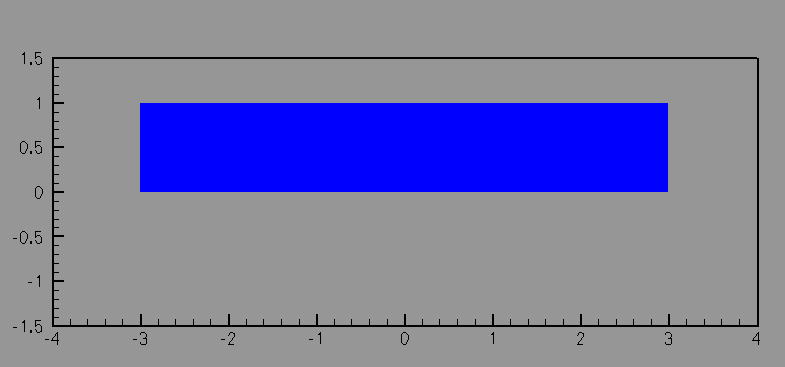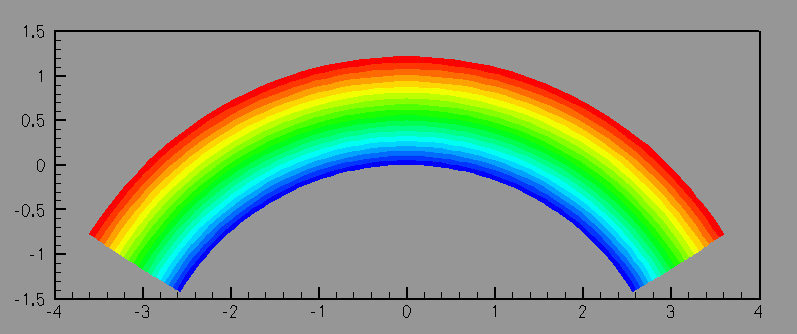Thermoelasticity: Combining the Heat equation and non-linear Solid Mechanics

Undeformed configuration of an elastic block.
We consider the uniform steady thermal expansion of an elastic body that is differentially heated. The top surface is heated and the bottom surface is maintained at the reference temperature, which leads to a uniform temperature gradient throughout the material. The material expands more near the upper surface than near the lower surface, deforming the initially rectangular block into an curved configuration.

Deformed elastica when the top surface is heated and the lower surface is maintained at the reference temperature. The contours indicate the temperature of the body.
The driver code
The driver code for this example is given below:
//LIC// ====================================================================
//LIC// This file forms part of oomph-lib, the object-oriented,
//LIC// multi-physics finite-element library, available
//LIC// at http://www.oomph-lib.org.
//LIC//
//LIC// Copyright (C) 2006-2025 Matthias Heil and Andrew Hazel
//LIC//
//LIC// This library is free software; you can redistribute it and/or
//LIC// modify it under the terms of the GNU Lesser General Public
//LIC// License as published by the Free Software Foundation; either
//LIC// version 2.1 of the License, or (at your option) any later version.
//LIC//
//LIC// This library is distributed in the hope that it will be useful,
//LIC// but WITHOUT ANY WARRANTY; without even the implied warranty of
//LIC// MERCHANTABILITY or FITNESS FOR A PARTICULAR PURPOSE. See the GNU
//LIC// Lesser General Public License for more details.
//LIC//
//LIC// You should have received a copy of the GNU Lesser General Public
//LIC// License along with this library; if not, write to the Free Software
//LIC// Foundation, Inc., 51 Franklin Street, Fifth Floor, Boston, MA
//LIC// 02110-1301 USA.
//LIC//
//LIC// The authors may be contacted at oomph-lib@maths.man.ac.uk.
//LIC//
//LIC//====================================================================
//Driver for a multi-physics problem that couples the
//unsteady heat equation to the equations of large-displacement solid
//mechanics
//Oomph-lib headers, we require the generic, unsteady heat
//and and elements.
#include "generic.h"
#include "solid.h"
#include "unsteady_heat.h"
// The mesh is our standard rectangular quadmesh
#include "meshes/rectangular_quadmesh.h"
// Use the oomph and std namespaces
using namespace oomph;
using namespace std;
//=====================================================================
/// A class that solves the equations of steady thermoelasticity by
/// combining the UnsteadyHeat and PVD equations into a single element.
/// A temperature-dependent growth term is added to the PVD equations by
/// overloading the member function get_istotropic_growth()
//======================class definition==============================
template<unsigned DIM>
public virtual QUnsteadyHeatElement<DIM,3>
{
private:
/// Pointer to a private data member, the thermal expansion coefficient
double* Alpha_pt;
/// The static default value of Alpha
public:
/// Constructor: call the underlying constructors and
/// initialise the pointer to Alpha to point
/// to the default value of 1.0.
QThermalPVDElement() : QPVDElement<DIM,3>(),
QUnsteadyHeatElement<DIM,3>()
{
}
/// The required number of values stored at the nodes is the sum of the
/// required values of the two single-physics elements. Note that this step is
/// generic for any multi-physics element of this type.
{return (QUnsteadyHeatElement<DIM,3>::required_nvalue(n) +
QPVDElement<DIM,3>::required_nvalue(n));}
/// Access function for the thermal expansion coefficient (const version)
/// Access function for the pointer to the thermal expansion coefficientr
/// Overload the standard output function with the broken default
void output(ostream &outfile) {FiniteElement::output(outfile);}
/// Output function:
/// Output x, y, u, v, p, theta at Nplot^DIM plot points
// Start of output function
{
//vector of local coordinates
Vector<double> s(DIM);
Vector<double> xi(DIM);
// Tecplot header info
outfile << this->tecplot_zone_string(nplot);
// Loop over plot points
unsigned num_plot_points=this->nplot_points(nplot);
for (unsigned iplot=0;iplot<num_plot_points;iplot++)
{
// Get local coordinates of plot point
this->get_s_plot(iplot,nplot,s);
// Get the Lagrangian coordinate
this->interpolated_xi(s,xi);
// Output the position of the plot point
for(unsigned i=0;i<DIM;i++)
{outfile << this->interpolated_x(s,i) << " ";}
// Output the temperature (the advected variable) at the plot point
outfile << this->interpolated_u_ust_heat(s) << std::endl;
}
outfile << std::endl;
// Write tecplot footer (e.g. FE connectivity lists)
this->write_tecplot_zone_footer(outfile,nplot);
} //End of output function
/// C-style output function: Broken default
void output(FILE* file_pt)
{FiniteElement::output(file_pt);}
/// C-style output function: Broken default
{FiniteElement::output(file_pt,n_plot);}
/// Output function for an exact solution: Broken default
FiniteElement::SteadyExactSolutionFctPt
exact_soln_pt)
{FiniteElement::output_fct(outfile,Nplot,exact_soln_pt);}
/// Output function for a time-dependent exact solution:
/// Broken default.
const double& time,
FiniteElement::UnsteadyExactSolutionFctPt
exact_soln_pt)
{
FiniteElement::
output_fct(outfile,Nplot,time,exact_soln_pt);
}
/// Compute norm of solution: use the version in the unsteady heat
/// class
{
QUnsteadyHeatElement<DIM,3>::compute_norm(el_norm);
}
/// Validate against exact solution at given time
/// Solution is provided via function pointer.
/// Plot at a given number of plot points and compute L2 error
/// and L2 norm of velocity solution over element
/// Call the broken default
void compute_error(ostream &outfile,
FiniteElement::UnsteadyExactSolutionFctPt exact_soln_pt,
const double& time,
double& error, double& norm)
{FiniteElement::compute_error(outfile,exact_soln_pt,
time,error,norm);}
/// Validate against exact solution.
/// Solution is provided via function pointer.
/// Plot at a given number of plot points and compute L2 error
/// and L2 norm of velocity solution over element
/// Call the broken default
void compute_error(ostream &outfile,
FiniteElement::SteadyExactSolutionFctPt exact_soln_pt,
double& error, double& norm)
{FiniteElement::compute_error(outfile,exact_soln_pt,error,norm);}
/// Overload the growth function in the advection-diffusion equations.
/// to be temperature-dependent.
const Vector<double>& xi, double &gamma) const
{
//The growth is the undeformed coefficient plus linear thermal
//expansion
gamma = 1.0 + (*Alpha_pt)*this->interpolated_u_ust_heat(s);
}
/// Calculate the contribution to the residual vector.
/// We assume that the vector has been initialised to zero
/// before this function is called.
void fill_in_contribution_to_residuals(Vector<double> &residuals)
{
//Call the residuals of the advection-diffusion eqautions
UnsteadyHeatEquations<DIM>::
fill_in_contribution_to_residuals(residuals);
//Call the residuals of the Navier-Stokes equations
PVDEquations<DIM>::
fill_in_contribution_to_residuals(residuals);
}
/// Compute the element's residual Vector and the jacobian matrix
/// We assume that the residuals vector and jacobian matrix have been
/// initialised to zero before calling this function
void fill_in_contribution_to_jacobian(Vector<double> &residuals,
DenseMatrix<double> &jacobian)
{
//Just call standard finite difference for a SolidFiniteElement so
//that variations in the nodal positions are taken into account
SolidFiniteElement::fill_in_contribution_to_jacobian(residuals,jacobian);
}
};
//=========================================================================
/// Set the default physical value to be one
//=========================================================================
template<>
//======start_of_namespace============================================
/// Namespace for the physical parameters in the problem
//====================================================================
namespace Global_Physical_Variables
{
/// Thermal expansion coefficient
double Alpha=0.0;
/// Young's modulus for solid mechanics
/// Poisson ratio for solid mechanics
/// We need a constitutive law for the solid mechanics
ConstitutiveLaw* Constitutive_law_pt;
} // end_of_namespace
//////////////////////////////////////////////////////////////////////
//////////////////////////////////////////////////////////////////////
//////////////////////////////////////////////////////////////////////
//====== start_of_problem_class=======================================
/// 2D Thermoelasticity problem on rectangular domain, discretised
/// with refineable elements. The specific type
/// of element is specified via the template parameter.
//====================================================================
template<class ELEMENT>
{
public:
/// Constructor
/// Destructor. Empty
~ThermalProblem() {}
/// Update the problem specs before solve (empty)
void actions_before_newton_solve() {}
/// Update the problem after solve (empty)
void actions_after_newton_solve(){}
/// Actions before adapt:(empty)
void actions_before_adapt(){}
/// Doc the solution.
void doc_solution();
/// Overloaded version of the problem's access function to
/// the mesh. Recasts the pointer to the base Mesh object to
/// the actual mesh type.
ElasticRectangularQuadMesh<ELEMENT>* mesh_pt()
{
return dynamic_cast<ElasticRectangularQuadMesh<ELEMENT>*>(
Problem::mesh_pt());
}
private:
/// DocInfo object
DocInfo Doc_info;
}; // end of problem class
//========================================================================
/// Constructor for Convection problem
//========================================================================
template<class ELEMENT>
{
// Set output directory
Doc_info.set_directory("RESLT");
// # of elements in x-direction
unsigned n_x=8;
// # of elements in y-direction
unsigned n_y=8;
// Domain length in x-direction
double l_x=3.0;
// Domain length in y-direction
double l_y=1.0;
// Build a standard rectangular quadmesh
Problem::mesh_pt() =
new ElasticRectangularQuadMesh<ELEMENT>(n_x,n_y,l_x,l_y);
// Set the boundary conditions for this problem: All nodes are
// free by default -- only need to pin the ones that have Dirichlet
// conditions here
{
//The temperature is prescribed on the lower boundary
unsigned n_boundary_node = mesh_pt()->nboundary_node(0);
for(unsigned n=0;n<n_boundary_node;n++)
{
//Get the pointer to the node
Node* nod_pt = mesh_pt()->boundary_node_pt(0,n);
//Pin the temperature at the node
nod_pt->pin(0);
//Set the temperature to 0.0 (cooled)
nod_pt->set_value(0,0.0);
}
//The temperature is prescribed on the upper boundary
n_boundary_node = mesh_pt()->nboundary_node(2);
for(unsigned n=0;n<n_boundary_node;n++)
{
Node* nod_pt = mesh_pt()->boundary_node_pt(2,n);
//Pin the temperature at the node
nod_pt->pin(0);
//Set the temperature to 1.0 (heated)
nod_pt->set_value(0,1.0);
}
//The horizontal-position is fixed on the vertical boundary (symmetry)
n_boundary_node = mesh_pt()->nboundary_node(1);
for(unsigned n=0;n<n_boundary_node;n++)
{
static_cast<SolidNode*>(mesh_pt()->boundary_node_pt(1,n))->pin_position(0);
}
//We need to completely fix the lower-right corner of the block to
//prevent vertical rigid-body motions
static_cast<SolidNode*>(mesh_pt()->boundary_node_pt(1,0))->pin_position(1);
}
// Complete the build of all elements so they are fully functional
// Loop over the elements to set up element-specific
// things that cannot be handled by the (argument-free!) ELEMENT
// constructor.
unsigned n_element = mesh_pt()->nelement();
for(unsigned int i=0;i<n_element;i++)
{
// Upcast from GeneralsedElement to the present element
ELEMENT *el_pt = dynamic_cast<ELEMENT*>(mesh_pt()->element_pt(i));
// Set the coefficient of thermal expansion
el_pt->alpha_pt() = &Global_Physical_Variables::Alpha;
// Set a constitutive law
el_pt->constitutive_law_pt() =
}
// Setup equation numbering scheme
cout <<"Number of equations: " << assign_eqn_numbers() << endl;
} // end of constructor
//========================================================================
/// Doc the solution
//========================================================================
template<class ELEMENT>
{
//Declare an output stream and filename
ofstream some_file;
char filename[100];
// Number of plot points: npts x npts
unsigned npts=5;
// Output solution
//-----------------
snprintf(filename, sizeof(filename), "%s/soln%i.dat",Doc_info.directory().c_str(),
Doc_info.number());
some_file.open(filename);
mesh_pt()->output(some_file,npts);
some_file.close();
Doc_info.number()++;
} // end of doc
//=====================================================================
/// Driver code for 2D Thermoelasticity problem
//====================================================================
{
// "Big G" Linear constitutive equations:
new GeneralisedHookean(&Global_Physical_Variables::Nu,
//Construct our problem
ThermalProblem<QThermalPVDElement<2> > problem;
//Number of quasi-steady steps
unsigned n_steps = 11;
//If we have additional command line arguemnts, take fewer steps
if(argc > 1) {n_steps = 2;}
for(unsigned i=0;i<n_steps;i++)
{
//Increase the thermal expansion coefficient
Global_Physical_Variables::Alpha = 0.1*i;
//Perform a single steady newton solve
problem.newton_solve();
//Document the solution
problem.doc_solution();
}
} // end of main
A class that solves the equations of steady thermoelasticity by combining the UnsteadyHeat and PVD eq...
Definition thermo.cc:54
const double & alpha() const
Access function for the thermal expansion coefficient (const version)
Definition thermo.cc:81
QThermalPVDElement()
Constructor: call the underlying constructors and initialise the pointer to Alpha to point to the def...
Definition thermo.cc:67
void get_isotropic_growth(const unsigned &ipt, const Vector< double > &s, const Vector< double > &xi, double &gamma) const
Overload the growth function in the advection-diffusion equations. to be temperature-dependent.
Definition thermo.cc:181
unsigned required_nvalue(const unsigned &n) const
The required number of values stored at the nodes is the sum of the required values of the two single...
Definition thermo.cc:76
void compute_error(ostream &outfile, FiniteElement::UnsteadyExactSolutionFctPt exact_soln_pt, const double &time, double &error, double &norm)
Validate against exact solution at given time Solution is provided via function pointer....
Definition thermo.cc:162
void fill_in_contribution_to_jacobian(Vector< double > &residuals, DenseMatrix< double > &jacobian)
Compute the element's residual Vector and the jacobian matrix We assume that the residuals vector and...
Definition thermo.cc:205
void compute_norm(double &el_norm)
Compute norm of solution: use the version in the unsteady heat class.
Definition thermo.cc:152
double * Alpha_pt
Pointer to a private data member, the thermal expansion coefficient.
Definition thermo.cc:58
void output(ostream &outfile)
Overload the standard output function with the broken default.
Definition thermo.cc:87
void fill_in_contribution_to_residuals(Vector< double > &residuals)
Calculate the contribution to the residual vector. We assume that the vector has been initialised to ...
Definition thermo.cc:192
void output_fct(ostream &outfile, const unsigned &Nplot, FiniteElement::SteadyExactSolutionFctPt exact_soln_pt)
Output function for an exact solution: Broken default.
Definition thermo.cc:133
static double Default_Physical_Constant_Value
The static default value of Alpha.
Definition thermo.cc:61
double *& alpha_pt()
Access function for the pointer to the thermal expansion coefficientr.
Definition thermo.cc:84
2D Thermoelasticity problem on rectangular domain, discretised with refineable elements....
Definition thermo.cc:251
ElasticRectangularQuadMesh< ELEMENT > * mesh_pt()
Overloaded version of the problem's access function to the mesh. Recasts the pointer to the base Mesh...
Definition thermo.cc:276
void actions_before_newton_solve()
Update the problem specs before solve (empty)
Definition thermo.cc:262
Namespace for the physical parameters in the problem.
Definition thermo.cc:225
ConstitutiveLaw * Constitutive_law_pt
We need a constitutive law for the solid mechanics.
Definition thermo.cc:236
Source files for this tutorial
- The source files for this tutorial are located in the directory:
demo_drivers/multi_physics/thermo/
- The driver code is:
demo_drivers/multi_physics/thermo/thermo.cc
PDF file
A pdf version of this document is available. \